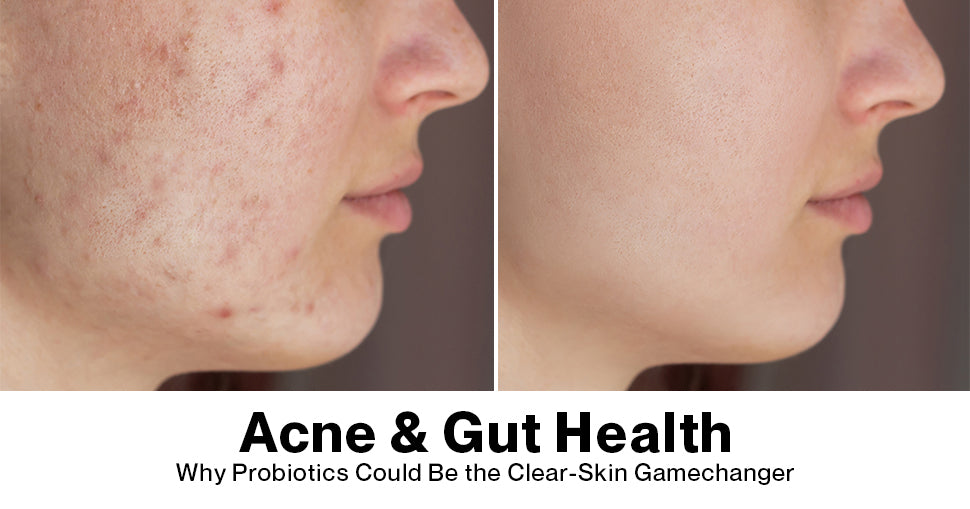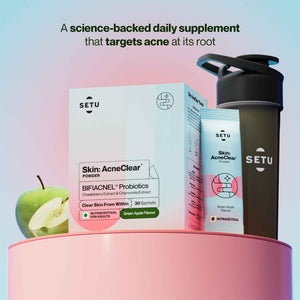Acne and Gut Health: Why Probiotics Could Be the Clear-Skin Gamechanger
13 Oct 2025
If you've tried every topical treatment, changed your skincare routine multiple times, and still struggle with persistent acne, the solution might not be on your bathroom shelf - it could be in your gut. The connection between gut health and skin conditions, particularly acne, is one of the most exciting developments in dermatology research. Understanding this gut-skin axis could be the key to achieving the clear, radiant complexion you've been dreaming of.
The Gut-Skin Connection: More Than Just a Theory
Your gut and skin might seem like completely separate systems, but they're intimately connected through what scientists call the gut-skin axis. This bidirectional communication pathway means that what happens in your digestive system can directly impact the appearance and health of your skin.
Your gut contains trillions of microorganisms collectively known as the gut microbiome. These bacteria, fungi, and other microbes play crucial roles in digestion, immune function, and even mental health. When this delicate ecosystem falls out of balance - a condition called dysbiosis - the effects can manifest in surprising ways, including inflammatory skin conditions like acne.
Research has shown that people with acne often have altered gut microbiome compositions compared to those with clear skin. This imbalance can trigger systemic inflammation, increase oxidative stress, and disrupt hormone regulation - all factors that contribute to acne formation.
How Poor Gut Health Triggers Acne Breakouts
Understanding the mechanisms behind the gut-skin connection helps explain why addressing internal health can lead to external beauty. Here's how an unhealthy gut can contribute to acne:
Increased Inflammation: When your gut microbiome is imbalanced, it can lead to increased intestinal permeability, often called "leaky gut." This allows bacteria and toxins to enter your bloodstream, triggering a systemic inflammatory response. Since acne is fundamentally an inflammatory condition, this widespread inflammation can exacerbate breakouts and make existing acne worse.
Hormonal Disruption: Your gut bacteria play a surprising role in hormone metabolism, including the regulation of androgens and estrogens. An unhealthy gut can interfere with this process, leading to hormonal imbalances that stimulate excess sebum production—a primary driver of acne formation.
Impaired Nutrient Absorption: A compromised gut cannot effectively absorb essential nutrients like zinc, vitamin A, and omega-3 fatty acids, all of which are crucial for maintaining healthy skin. These deficiencies can weaken your skin's natural barrier function and healing capabilities.
Immune System Dysregulation: Approximately 70% of your immune system resides in your gut. When gut health suffers, immune function becomes compromised, making your skin more susceptible to the bacteria that cause acne, particularly Cutibacterium acnes (formerly Propionibacterium acnes).
The Probiotic Solution: Healing from Within
Probiotics—beneficial bacteria that support gut health—have emerged as a promising approach to managing acne. These live microorganisms help restore balance to your gut microbiome, addressing acne at its root cause rather than just treating surface symptoms.
Clinical studies have demonstrated the effectiveness of probiotics for acne management. One study found that participants who took probiotic supplements experienced significant improvements in inflammatory acne lesions. Another study showed that combining probiotics with standard acne treatments produced better results than using conventional treatments alone.
How Probiotics Improve Acne
Probiotics work through multiple mechanisms to promote clearer skin:
-
Anti-Inflammatory Effects: Beneficial bacteria produce anti-inflammatory compounds that help calm systemic inflammation, reducing the inflammatory response that leads to red, painful acne lesions.
-
Strengthening the Gut Barrier: Probiotics help maintain the integrity of your intestinal lining, preventing the leakage of inflammatory compounds into your bloodstream.
-
Antimicrobial Properties: Certain probiotic strains produce substances that inhibit the growth of acne-causing bacteria, both in your gut and potentially on your skin.
-
Stress Reduction: The gut-brain-skin axis means that gut health impacts stress levels, and stress is a well-known acne trigger. By supporting a healthy gut microbiome, probiotics may help modulate your stress response.
Beyond Probiotics: A Holistic Approach to Clear Skin
While probiotics offer powerful benefits for acne management, the most effective approach is internal gut support. This inside-out strategy addresses acne from multiple angles, maximizing your chances of achieving clear, healthy skin.
Dietary Considerations for Gut and Skin Health
Supporting your gut microbiome through diet amplifies the benefits of probiotic supplementation:
Eat Prebiotic Foods: Prebiotics are the fiber-rich foods that feed beneficial gut bacteria. Include plenty of garlic, onions, asparagus, bananas, and whole grains in your diet.
Fermented Foods: Natural sources of probiotics include yogurt, kefir, sauerkraut, kimchi, and kombucha. Adding these to your meals provides beneficial bacteria along with other nutrients.
Anti-Inflammatory Foods: Omega-3 rich foods like salmon, walnuts, and flaxseeds help reduce inflammation throughout your body, including your skin.
Limit Inflammatory Foods: Reduce consumption of high-glycemic foods, excessive dairy, and processed foods, which can disrupt gut health and trigger acne breakouts.
Supplements: Products like Setu Skin: AcneClear, formulated with Bifiacnel to target acne at its root, represent a new gen approach to fighting acne. By addressing multiple acne pathways simultaneously, such targeted formulations can enhance the results you achieve through gut health optimization.
Lifestyle Factors That Support the Gut-Skin Axis
Beyond probiotics and diet, several lifestyle factors influence both gut health and skin appearance:
Stress Management: Chronic stress disrupts gut bacteria balance and triggers inflammatory responses. Incorporate stress-reduction practices like meditation, yoga, or regular exercise.
Quality Sleep: Poor sleep negatively impacts gut microbiome diversity and skin regeneration. Aim for 7-9 hours of quality sleep nightly.
Hydration: Adequate water intake supports both digestive function and skin hydration.
Exercise: Regular physical activity promotes healthy gut bacteria diversity and improves circulation to the skin.
What to Expect: Timeline and Realistic Results
When starting probiotics for acne, patience is essential. Unlike topical treatments that might show some results within days, internal changes take time. Most people begin noticing improvements in their skin after 4-8 weeks of consistent probiotic use, though some may see changes sooner or later depending on individual factors.
During the first few weeks, focus on consistency rather than immediate results. Your gut microbiome needs time to rebalance, and these internal changes will gradually manifest as clearer, healthier-looking skin. Some people experience a temporary adjustment period as their gut adapts, but this typically resolves quickly.
For optimal results, maintain your probiotic regimen for at least three months while also addressing other factors like diet, stress, and topical skincare. This comprehensive approach offers the best chance of achieving lasting improvements in your skin.
The Future of Acne Treatment is Here
The recognition of the gut-skin connection has revolutionized our understanding of acne. Rather than viewing breakouts as purely a surface problem, we now understand that true skin health reflects internal wellness. Probiotics offer a scientifically-supported way to address acne from the inside out, targeting the root causes rather than just managing symptoms.
By supporting your gut microbiome with probiotics, eating a skin-friendly diet, managing stress, and using targeted topical treatments, you create the ideal conditions for clear, radiant skin. This holistic approach acknowledges that your skin is a reflection of your overall health—and when you nurture your body from within, your complexion naturally glows from without.
If you've been battling stubborn acne, it might be time to look beyond your medicine cabinet and into your gut. The path to clear skin could start with the microscopic allies living in your digestive system.
Skin: AcneClear - Powder
- ₹1,344
- ₹1,344
-
₹1,700 - ( 20% OFF)
Categories
- Choosing a selection results in a full page refresh.
- Press the space key then arrow keys to make a selection.
this is the sidecart
















